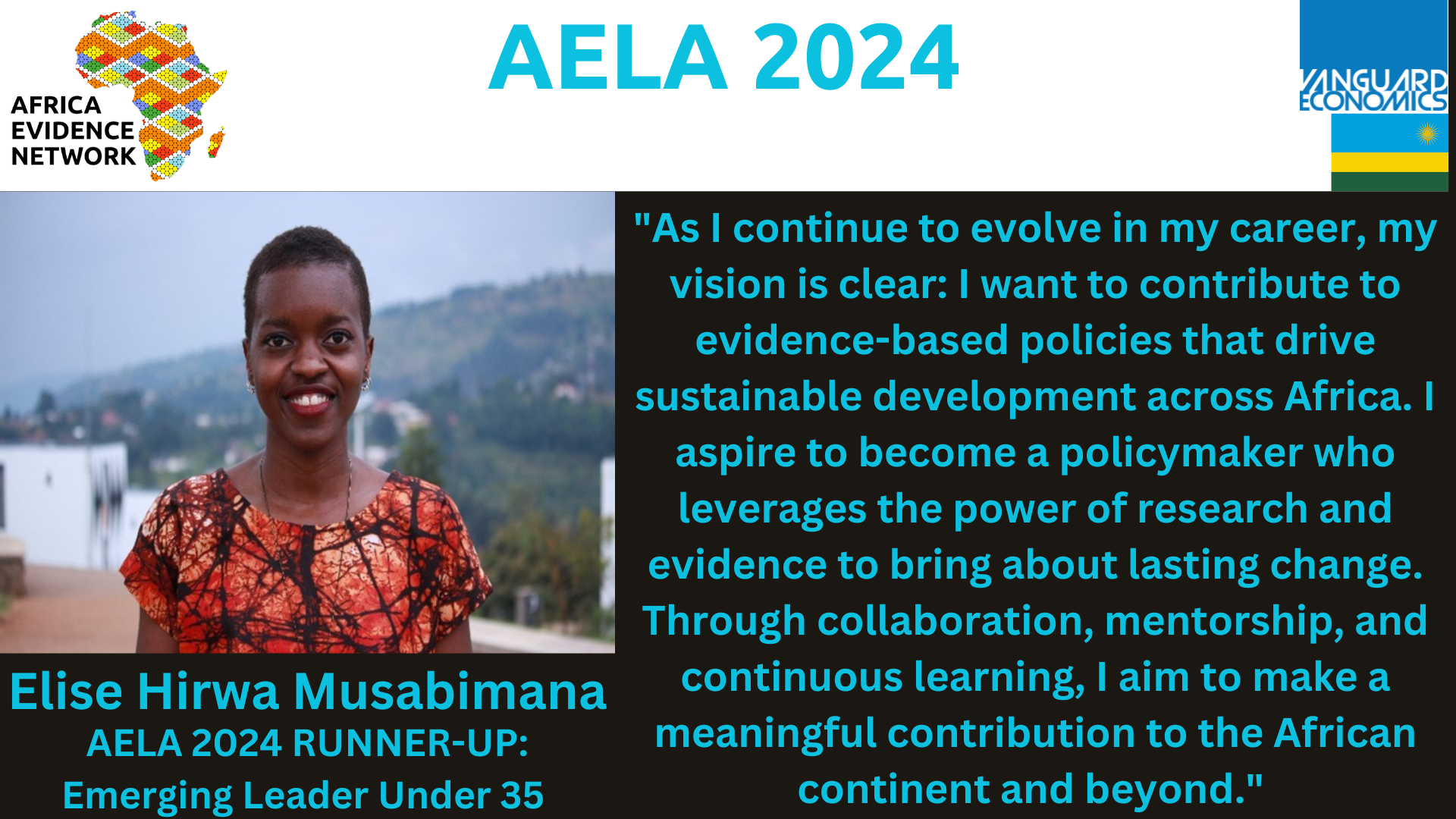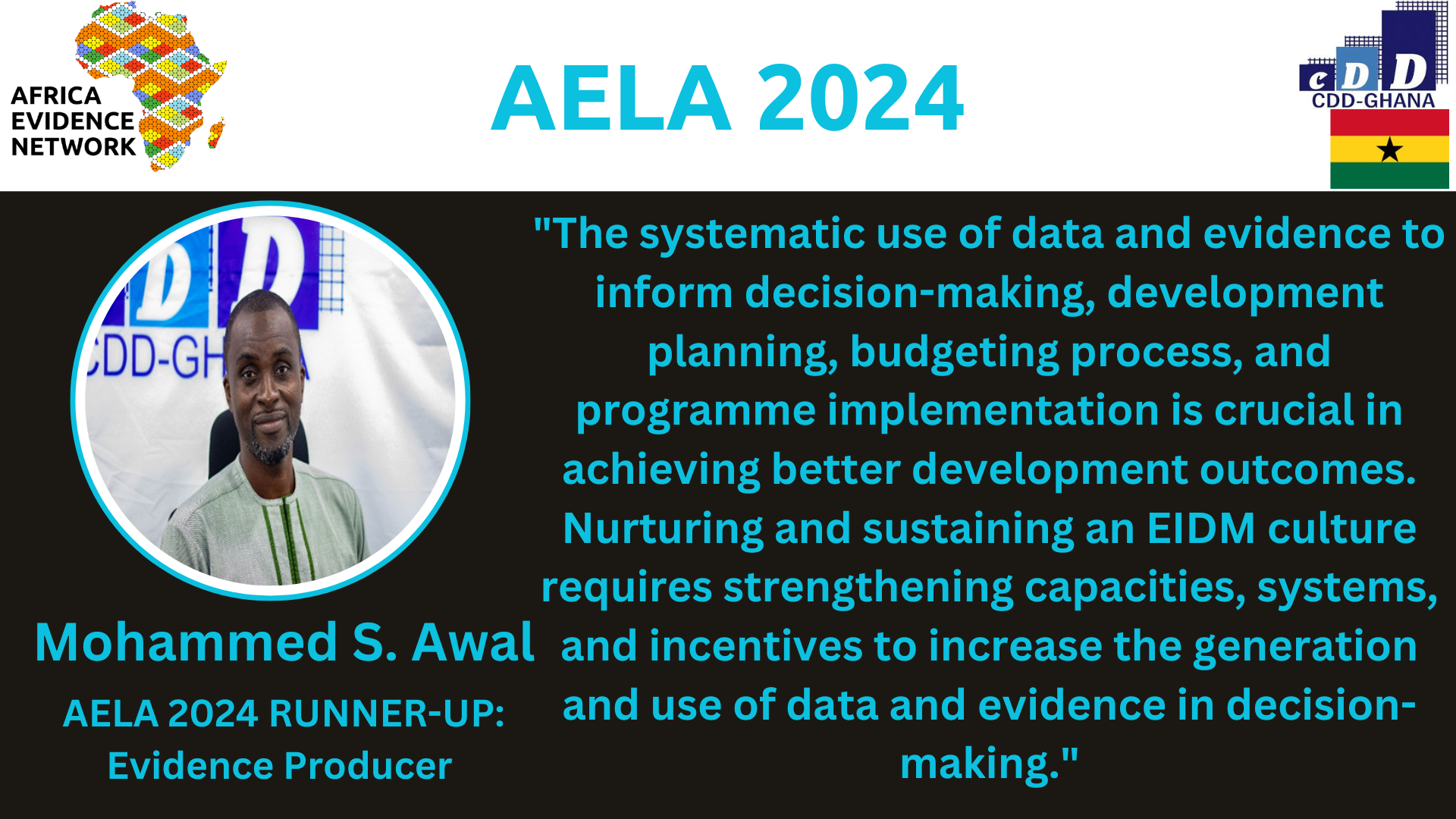
Elise Hirwa Musabimana is a runner-up of the Africa Evidence Leadership Award 2024 in the Emerging Leader Under 35 category offered by the Africa Evidence Network. We asked Elise to reflect on her work.
Growing up in Rwanda, I believed meaningful change could be achieved through hard work and dedication. I had no idea that my path would lead me to become a passionate advocate for evidence-based policy, Made in Africa Evaluation (MAE), sustainable development, and social justice. I now find myself at the intersection of research, policymaking, and leadership, striving to contribute to a healthier and more equitable world.
The Beginnings: A Foundation in Environmental Health
My journey began at the University of Rwanda, where I pursued a Bachelor of Science in Environmental Health Sciences. This experience deepened my understanding of public health, disease control, and environmental safety—key issues that deeply affect many communities in developing countries like Rwanda. My coursework in epidemiology, biostatistics, food safety, and occupational health helped me appreciate the importance of research in crafting effective health interventions.
As I advanced in my studies, I developed a passion for addressing complex global health challenges. This led me to pursue a Master of Science in Global Health Delivery at the University of Global Health Equity (UGHE), where I specialised in the One Health approach. This interdisciplinary training exposed me to critical areas such as infectious disease management, ecosystem health, and climate change impacts on health. One of the key learnings that stood out to me was the value of evidence-based global health—a principle that has since become central to my work.
Professional Experience: Vanguard Economics and Beyond
After completing my MSc, I was fortunate to join Vanguard Economics Ltd, a leading consultancy firm in Kigali, Rwanda. As a Research Associate and Senior Analyst in Data and Monitoring, Evaluation, and Learning (MEL), I worked on various projects to improve development outcomes. I became proficient in designing and coordinating research, managing enumerators for data collection, and facilitating workshops. My time at Vanguard allowed me to collaborate with major organisations like the Mastercard Foundation, where we conducted key studies to inform their Young Africa Works strategy.
In my role, I delved into data analytics using tools like SPSS, MAXQDA, and R, applying them to extract insights that could influence development programs. One particular project was with the African Women Rise Initiative, where we conducted qualitative research to understand better the challenges women business owners face across the continent. Projects like these have allowed me to contribute to initiatives directly empowering communities, focusing on Genser Equity and Social Inclusion (GESI).
Leadership has always been an integral part of my journey. Since my undergraduate days, I have taken on leadership roles—whether serving as the founder and Director of Partnerships for the University of Public Health Students Association or being part of the strategic development committee at Vanguard Economics. Effective leadership requires empathy, vision, and evidence-based decision-making, qualities I have honed through years of hands-on experience.
One of the most rewarding aspects of my career has been the ability to contribute to strategic documents that shape long-term goals. As part of the strategic development committee at Vanguard Economics, I ensured that our Data & MEL division’s inputs were well-represented, helping to chart the organisation’s future direction.
Publications and Contributions
Through my work, I have had the opportunity to contribute to various publications, including research on snakebite envenomation treatment in Rwanda, an exploration of fluorosis-related stigma in the Western Province, and a case study of Rwanda’s Primary Health care Preparedness and Response to COVID-19. Each publication represents a step forward in raising awareness about public health issues that often go unnoticed but profoundly impact vulnerable populations.
Next steps
As I continue to evolve in my career, my vision is clear: I want to contribute to evidence-based policies that drive sustainable development across Africa. I believe that by empowering communities, especially women and youth, we can unlock the continent’s potential. Ultimately, my journey is far from over. I aspire to become a policymaker who leverages the power of research and evidence to bring about lasting change. Through collaboration, mentorship, and continuous learning, I aim to make a meaningful contribution to the African continent and beyond.
About the author: Elise Hirwa Musabimana is a Made in Africa evaluation enthusiast and advocate for sustainable development and social justice living in Rwanda. With a commitment to improving healthcare systems and promoting equitable access to resources, Elise's journey in the field of global health delivery has been marked by a series of academic achievements, including publications, professional experiences, and community engagements.
Elise's educational foundation is rooted in her pursuit of understanding and addressing environmental health challenges. She earned her Bachelor of Science in Environmental Health Sciences from the University of Rwanda, where she delved into diverse subjects such as disease control, epidemiology, and food safety. Building upon this groundwork, she pursued a Master of Science in Global Health Delivery, focusing on One Health at the University of Global Health Equity in Kigali. This advanced degree equipped her with a comprehensive understanding of evidence-based global health, pandemic preparedness, and neglected tropical diseases, among other critical topics.
Her academic pursuits have been complemented by diverse professional experiences that have allowed her to apply her knowledge in real-world settings. As a Research Associate and Senior Analyst at Vanguard Economics Ltd, Elise played roles in various research projects, from designing studies to analysing data and writing comprehensive reports. Her involvement in the African Women's Rise Initiative and the Early Childhood Development project highlights her dedication to addressing pressing societal issues affecting vulnerable populations.
In addition to her professional endeavours, Elise is deeply engaged in community service and advocacy. As a Volunteer at the Rugero Adolescents and Reproductive Health program and a Member of the Grant Writing Committee at Rotary Club Kigali Virunga, she actively contributes to initiatives to empower youth and promote reproductive health education. Moreover, her previous role as Founder and Director of Partnerships at the University of Public Health Students Association underscores her leadership and organisational skills in fostering collaborations for community development.
Elise's expertise extends beyond her professional and academic achievements. She is proficient in both English and French, has strong analytical skills, and is well-versed in various data analytics tools such as SPSS, R, ArcGIS, and MAXQDA. Her ability to effectively communicate complex ideas and collaborate with diverse stakeholders has been instrumental in her success as a researcher, project coordinator, and advocate for positive change.
Driven by her passion for making a difference, Elise remains committed to leveraging her expertise to contribute to sustainable development efforts, particularly in Rwanda and Africa. In her free time, she enjoys reading political books, networking, and travelling in rural areas to understand different perspectives of communities.
Acknowledgements: The author(s) is solely responsible for the content of this article, including all errors or omissions; acknowledgements do not imply endorsement of the content. The author is grateful to Charity Chisoro for her guidance in preparing and finalising this article, as well as her editorial support.
Disclaimer: The views expressed in published blog posts, as well as any errors or omissions, are the sole responsibility of the author/s and do not represent the views of the Africa Evidence Network, its secretariat, advisory or reference groups, or its funders; nor does it imply endorsement by the afore-mentioned parties.
Suggested citation: Musabimana, E.H. (2024) From Environmental Health to Evidence-Based Policy: My Journey in Research and Development. Blog posting on 16 August 2024. Available at: https://www.africaevidencenetwork.org/en/learning-space/article/366/
